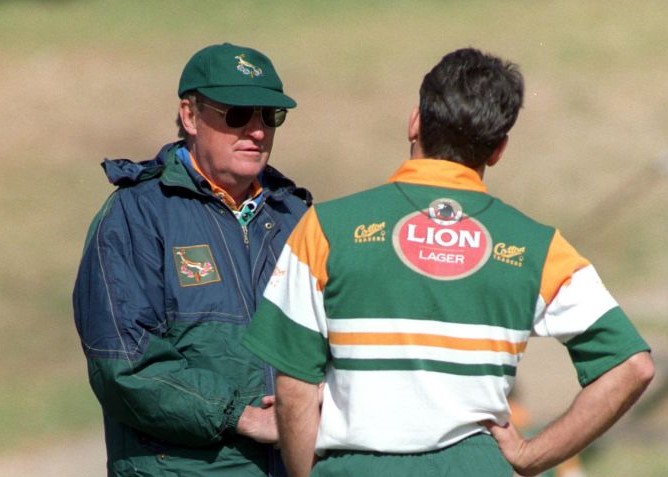Members of the 1995 World Cup-winning Springbok team have recalled how the gruelling training sessions put together by coach Kitch Christie proved the difference in the tournament.
Former Springbok captain Francois Pienaar, together with team manager Morne du Plessis as well as Joel Stransky and Os du Randt, spoke with historian Dr Dean Allen as part of a celebration of the 25th anniversary of the 1995 RWC final – which took place on 24 June.
As has been told, the Springboks were put through a tough pre-season at the Wanderers Stadium in Johannesburg before the 1995 World Cup with the emphasis to make them to be one of the fittest teams in the tournament.
ALSO READ: ’95 Springboks pay tribute to fallen teammates
Former Springbok prop Os du Randt – who was a youngster in the squad at the time – explained how those training sessions made a massive difference in the final against the All Blacks.
‘Coming into the side, a year and a half before that I hadn’t even thought I was going to play for the Springboks, much less in the World Cup,’ Du Randt said. ‘Being part of the squad, it’s only afterwards that you realise how much everybody contributed to what the team achieved.
‘I had a chat with Francois the other day where I thought Kitch never coached because he didn’t speak to us. I thought him and Francois sorted everything out before training and everything went smoothly during training. It was very professional. Coming out of the Free State, we weren’t that professional so it was a bit of a wake-up call for me.
‘Training that power half hour, I hated every minute of that. But [New Zealand prop] Olo Brown was one of the world’s best scrummagers. As a tight five, the All Blacks played 45 Tests together consecutively. I thought we had the better of them in the scrum. That was because of the hard work beforehand, before the World Cup. Even now when I drive past Wanderers, where we trained, I still get nerves. Those steps there, I can’t remember how many we did. We were so fit and strong. We did around 80 scrums in the morning and then 120 scrums against the scrum machine.’
Pienaar further explained the concept of the ‘power half hour’ but added that he felt the 1995 Springboks were far more skilful than what they were given credit for.
‘So, the power half hour that Os refers to, we would train fitness and then we would do our game-plan training,’ Pienaar explained. ‘It would be intense and you would be knackered. Then we did this power half hour which was the toughest thing I have gone through and I think everybody went through. We had these benches that we had to climb on and we would count and every player needed to be in time. If somebody fell behind, we would give him the opportunity to come back and if he couldn’t, then we would start again from scratch.
‘We did restarts and we said we wanted 20 perfect restarts. So Joel would kick to us and we would catch the ball, but even if we spilled the ball on the 16th restart, we would start again. That was the regime that Kitch brought in. He would say a drop goal is the easiest three points on the rugby field and poor Joel had to kick and kick and kick.
PIENAAR: I wished I had hugged Mandela
‘That team was not only fit. It was insanely good, but the world didn’t know it. We came out of isolation in 1992 and our Test-match areas were our provinces. When we were thrown together, there was no real culture because there were differences in our approaches to the game. But the world didn’t know how good that team was because we had just come out of isolation. We had a tough patch to find our culture. That was just a great team. The sad thing is that if we were able to carry on for another year together, I think we would have written some bigger records. Yes, we were fit and worked hard, but the skill in that team was special.’
READ: What’s in our latest issue?
Photo: Tony Marshall/EMPICS via Getty Images





